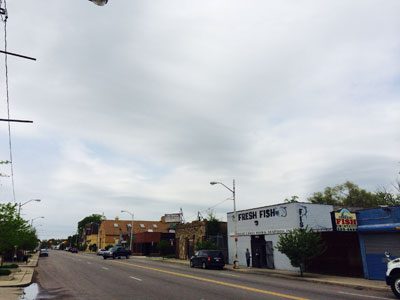
DETROIT — On Tuesday, the Arab American and Chaldean Council (ACC) held a Seven Mile Task Force meeting at its Youth Recreation and Leadership Center.
The ACC’s Seven Mile Taskforce Committee includes more than 40 members. Many are representatives from committee organizations that have joined the group to participate in its efforts to revitalize Seven Mile Road between John R. Road and Woodward Avenue.
ACC’s Seven Mile Project, a community and neighborhood development initiative, is aimed at revitalizing the area, both economically and residentially. Divided into three phases, the project has provided a glimmer of hope for the long-abandoned stretch of Seven Mile Road between John R. and Woodward. The project received its “Cool Cities” designation by the governor’s office in 2005.
Several potential stakeholders interested in helping the group redevelop the area also attended the meeting.
“We are looking forward to working with all of you and our partners who are willing to develop this area,” said ACC CEO and Founder, Dr. Haifa Fakhouri. “We want to work with everybody and welcome all ideas and anybody with open arms. We want to build the area around here so all partners are welcome.”
ACC’s vision, stimulated by its 2002 plan, is to revitalize this one mile segment of Seven Mile into a Chaldean-focused ethnic entertainment and business district which also serves the 5,000 residents along that stretch of Seven Mile. Its efforts were put on hold due to the 2008 economic downturn.
“Because of the economic setback we had to put a hold on the project, the state and the city were facing series financial issues,” Dr. Fakhouri said.
In the eighties, the area of Seven Mile was vibrant and boosted a large concentration of Chaldean Americans. The first Chaldean church in metro Detroit was built on Seven Mile to accommodate the community’s growing population. Today, there are very few Chaldeans still living there, because so many families have moved to the suburbs.
With Michigan’s turnaround, ACC is ready to start completing the project. The plans will focus on repopulating the area as a market for several of its businesses, and to help the city. During the past 15 years, ACC has attracted or invested more than $16 million in the area.
The Michigan State Housing Development Authority (MSHDA) has partnered up with the ACC to assist with redevelopment on the project. Edwin Harlin, a representative from MSHDA, gave a presentation and said the agency may act as a funding source for the project, but is not a developer.
“We can take down all the blight in that mile radius in this area, and you guys don’t have to…We do have the resources to assist community development,” Harlin said.
He says before development can take place, issues such as blight, stabilizing schools and public safety need to be addressed.
“We want to stabilize the schools because they are closing a lot of schools,” he said. “We want the children to walk to school and not have to walk past blight, and houses that are burned out.”
Once the issues, including blight, are resolved, developers will have more options of where and what they want to start building.
Michigan is one of only two states with a state run EB-5 Regional Center aimed at attracting foreign investors who want to live, work and create jobs in the state.
The Michigan EB-5 Regional Center will act as a vehicle to connect eligible foreign investors with potential development projects across the state, which in return could lead to permanent residency for them and their families.
“The EB-5 Regional Center is going to be critical as a utilization tool in this area,” Harlin said.






Leave a Reply